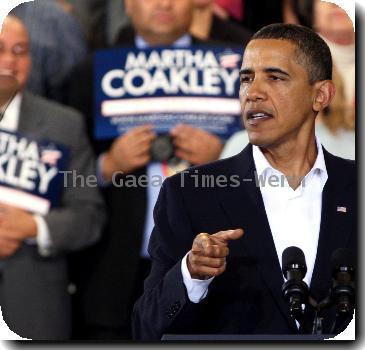European Union, Germany’s Merkel urge US to join action against some credit default swaps
By Aoife White, APTuesday, March 9, 2010
EU urges US to join in action against speculators
BRUSSELS — European officials urged the U.S. to join in a crackdown on speculators who bet against Europe’s currency union, warning they might ban some credit default swaps — opaque financial instruments blamed for worsening the world financial crisis.
German Chancellor Angela Merkel said Tuesday that “quick action is needed,” calling on the U.S. to “make a gesture” and curb the trades. Greek Prime Minister George Papandreou, in Washington to meet with President Barack Obama, is also calling for curbs on speculation that he blames for making his country’s debt crisis worse.
The European Commission threatened to ban “purely speculative naked sales on credit default swaps of sovereign debt” and said it would ask for a similar move globally at the Group of 20 summit of leading and emerging economies in June.
Credit default swaps are a form of insurance for buyers to protect them against the risk that a seller or borrower would default on a security such as a government bond. In “naked” sales, the buyer does not hold the underlying asset and faces no such risk — but can make a profit on the swap itself.
Papandreou on Monday compared the practice of selling naked credit default swaps to buying insurance on a neighbor’s house and then burning it down to collect.
In New York, the head of the U.S. Commodity Futures Trading Commission renewed his call for new regulation of the $600 trillion global financial derivatives market. CFTC Chairman Gary Gensler said such action would “greatly reduce” the risk posed by credit default swaps, which account for an estimated $60 trillion of the derivatives trade.
If Congress decides to exempt from new rules some derivatives transactions used by companies to hedge against risks, Gensler said in a speech, “there should be no such exemption for” credit default swaps, which are conducted almost entirely between financial institutions.
“The recent chill winds blowing through Europe, including the discovery that derivatives were used to help mask Greece’s fiscal health, are reminders of the pressing need for comprehensive regulation,” Gensler said in the text of his address to a financial industry conference.
An Obama administration official, speaking on condition of anonymity, said earlier Tuesday that the president’s reform plans would require more transparent trading of derivatives. “That reform would also give regulators enhanced tools to crack down on market manipulation and abuse through position limits, business conduct rules and tough prudential requirements,” the official said.
The official added that “the central task before the Greek government is to continue to move forward on their plans to restore fiscal stability and growth to its economy.”
A market frenzy in recent weeks saw traders make bets worth billions of dollars against the euro and on the chances of Greece not repaying its massive debts. Those market worries have undermined the 16-country currency and spilled over to other vulnerable eurozone members — such as Spain — and hiked their borrowing costs.
Eurozone leaders have blamed speculators in London and New York for worsening Europe’s government debt crisis.
Merkel is now suggesting setting up a eurozone bailout fund to rescue a member who risks default, although it would not come in time to help Greece now.
European Commission President Jose Manuel says EU regulators wanted “a fundamental reform in the derivatives market” and would put forward broad rule changes before the summer to increase market transparency and limit the risks.
But he also targeted naked credit default swaps, saying “it is not justified to buy an insurance by unseen interventions on a risk, on a purely speculative basis” and the EU would examine a ban and call for international action.
“These markets are very opaque, we are going to bring this issue to the G-20 and we are also to raise some of these issues in our bilateral contacts, particularly with the United States,” he told the European Parliament in Strasbourg.
If all else fails, he promised to put antitrust regulators on the case, who could examine if dealers formed an illegal cartel in agreeing to place coordinated bets against the euro. The Wall Street Journal has reported that U.S. regulators are looking into this issue.
Merkel said that a European monetary fund to bail out eurozone nations in need would send a clear signal to markets speculating that the currency union might break up. She said the crisis was forcing the EU to make changes that would allow more “coherent economic policymaking.”
Speaking after a meeting with Jean-Claude Juncker in Luxembourg, the head of the eurozone’s finance ministers, Merkel said a tighter framework that could handle a potential default by a eurozone country would send a clear “signal to markets that speculation cannot work.”
“We are thinking of all eurozone nations,” she said. “We agree that we must discourage financial market speculation.”
The EU’s executive commission — which must draft any reforms to EU law — said there are plans to set out some kind of framework to reinforce economic coordination and surveillance of EU countries by July.
__
Associated Press writer Robert Wielaard in Luxembourg and AP Business Writer Marcy Gordon in Washington contributed to this report.
Tags: Barack Obama, Brussels, Europe, Germany, Government Regulations, Greece, Industry Regulation, Luxembourg, North America, United States, Western Europe





